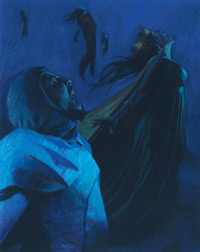FAQ
Official Rulings
Section 1: Check, Checkmate, and Stalemate
Q. If my move puts my opponent in (apparent) checkmate, does he get a chance to escape by playing a card in his hand?
A. Yes. The game ends only when one player has been checkmated and cannot escape on his own turn.
Q. The Checkmate Rule only says that regular cards may not directly cause checkmate. Does this mean I can make a move and play a Continuing Effect card that results in checkmate?
A. Yes.
Q. Can I play a regular card to deliver checkmate if I think my opponent has a card that will let him escape checkmate?
A. No. Your opponent's hand is irrelevant. If you try this, your card will be discarded with no effect.
Q. What happens if I place or leave my King in check, play a card to remove the check, and my opponent plays FOG OF WAR?
A. Both cards are discarded, and you must take back your illegal move and make another move. Both players have already played cards for this turn, so no further cards may be played.
Q. But what if playing the card was the only way to get out of checkmate?
A. Same effect, and you are checkmated since you have no legal move. Since checkmate was delivered earlier without the use of a card, it is still legal.
Q. What happens if I try to make a move, but my opponent plays a card (BOG) that results in an illegal final position (i.e., my King in check)?
A. No regular card may cause either player to place or leave his own King in check at the end of his own turn. If a played card breaks this rule, it has no effect. It is still considered played; the player must discard it and draw a new card. (Consider this an extension of the Checkmate Rule.)
Q. So my opponent can't play RIPOSTE if I capture the piece that is checking my King?
A. Yes, he can play RIPOSTE as long as this does not create checkmate. Since his piece can't capture next turn (he loses his next turn because of RIPOSTE), your turn doesn't end in check.
Q. Can a player castle through (or from) check if he immediately, on the same turn, plays a card to remove the check on the appropriate square(s) moved through or started from?
A. Yes, by extension of the last paragraph under The Checkmate Rule.
Q. Can a piece under the effect of PACIFIST (or FATAL ATTRACTION) give check?

A. No. Since capturing is impossible, it cannot give check (third paragraph under The Checkmate Rule).
Q. But on my turn I can play PEACE TALKS, remove the PACIFIST effect, and the King will be in check!
A. Yep.
Q. Can I leave my King in check if I CHALLENGE my opponent to move a type of piece that is not giving check? Can I move my King into check and play MYSTIC SHIELD?
A. Yes to both, again because capturing is impossible. Note that you will likely be back in check on your next turn, since neither CHALLENGE nor MYSTIC SHIELD are continuing effects.
Q. If VENDETTA is in play and your only possible captures would place (or leave) your King in check, have you lost, or is VENDETTA discarded?
A. Since you have no legal captures, VENDETTA is discarded.
Q. Normally, a King cannot castle into, out of, or through check. Obviously, SANCTUARY cannot put a King in check, but can it work out of or through check? Can the Rook capture on its move? Is this considered a Rook move or a King move?
A. Yes, it can work out of or through check. A rook capture would be impossible, since there can be "no pieces between them". Both pieces moved.
Q. If I've played COUP and subsequently lost my
Prince, what happens if my opponent plays PEACE TALKS and cancels COUP?

A. It would be illegal to play PEACE TALKS against COUP at that point, by The Checkmate Rule.
Q. What happens when there are no available spaces for the King to reappear on after playing UNDER ELF HILL?
A. Stalemate. The king is not in check, but the game cannot continue.
Q. How is stalemate defined?
A. Stalemate by repeated position is determined only by the state of the board, and is not affected by changes in the players' hands. Stalemate by lack of legal moves can (at the moving player's option) be escaped by the play of a card.
Section 2: Specific Pieces
Q. How do Pawns on the first rank move? What about Pawns that are moved back to the second rank?
A. Any Pawn on its first or second rank may move forward one or two (unoccupied) squares, regardless of any prior movement. If it is moved two squares forward, it may be captured en passant by a Pawn (but not a Crab) that threatens the square immediately behind its new position.
Q. What happens to promoted Pawns? If they are replaced with a Knight (for example), can I no longer RESURRECT that Knight? Can I bring back the Pawn piece?
A. You should treat it as if the Pawn were still on the board, marked in some way to note that it is now a Knight (or other piece). If you replace it with a captured piece of the appropriate type, you should treat the Pawn as if it were dead, and remember that the captured piece is still available for cards that affect captured pieces.
Q. If one of my Pawns reaches the back rank on my opponent's turn, when does it promote?
A. When the back rank is reached. If promotion occurs on your opponent's turn and you give check with your promotion, then the card that enabled the promotion is cancelled, by the extended Checkmate Rule.
Q. Can I promote a Pawn to a Prince?
A. No. Promotion is still limited to Knights, Bishops, Rooks, and Queens, just like in ordinary chess.
Q. Can CONFABULATED Pawns promote?
A. No.
Q. Can Pawns moving as other pieces (through DUBBING, BLESSING, etc.) promote?
A. No, unless the card explicitly says so.
Q. What cards can affect Crabs or Princes?

A. Cards that affect Pawns or Kings, respectively. You may also be CHALLENGED to move a Crab or a Prince specifically.
Q. Are the Prince and Crab considered distinct piece names for purposes of DOOMSAYER, or are they affected by uttering 'King' and 'Pawn'? Are NEUTRAL pieces affected by DOOMSAYER?
A. They are distinct piece names. By the transformed pieces rule, they can be affected by cards that name the original piece. In this case, you may remove the Crab after saying either "Pawn" or "Crab". Saying "King" has no effect, as usual. Saying "Prince" will force you to remove your Prince, and saying "Pawn" when your only pawn has been COUPED to be a King has no effect. Yes, either player may lose a NEUTRAL piece by naming it while DOOMSAYER is in effect.
Q. Can a King castle through check?
A. In Knightmare Chess, the restriction of castling through check is lifted. You may castle through, out of, or into check, so long as the King is not in check at the end of the turn. This holds regardless of whether or not a card is played during the turn.
Section 3: Specific Cards
A, B, C, D, E, F, G, H, I, K, L, M, N, O, P, R, S, T, U, V, W
Section 4: Miscellaneous
Q. When the deck runs out, do we reshuffle the discards into a new deck in a common-deck game?
A. Yes. Reshuffle the deck and continue drawing as normal.
Q. When a player uses a before-move card, can he then use another card during his regular move?
A. No. You may play no more than one card on your turn, whether it's before, instead of, or after your move.















